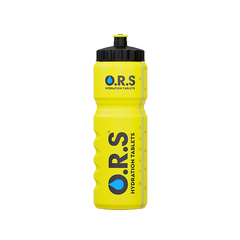Five Common First-Time Marathon Hydration Mistakes to Avoid

Spring is a popular season for marathon events, as we hope the worst of the winter chills have passed, and the weather is not yet too warm or humid. The London Marathon takes place on the 21 April for example, and there are numerous other events taking place around the country.
One of the biggest challenges for new marathon runners is knowing how to handle hydration. It’s crucial to get the balance right, otherwise it could undo all the hard training and preparation you have carried out and negatively affect your performance. Dehydration leads to fatigue, worse mental resilience, and can potentially cause muscle cramps.
While maintaining good hydration isn’t difficult or complicated, it’s important to be in tune with your body’s needs, and this may not be a skill that new marathon runners have developed properly yet. Here’s a look at some of the most common mistakes and how you can avoid them.
Drinking too much water before the event
It’s not enough to knock back a pint of water just before you set out. In fact, this is a very poor strategy, because your body can’t handle that much fluid at once and the kidneys will expel it. This means that you will be no more hydrated and will have to use up valuable time making water stops.
Instead, start hydrating on a regular basis two days before the event, or even earlier. This will mean that you have no need to overload on water in the morning before the event, and will be less likely to suffer from dehydration during the run.
Neglecting your electrolyte balance
Electrolytes are essential vitamins and minerals such as sodium and potassium that we lose through bodily fluids, particularly sweat. They play a key role in the fluid balance of the body and help to maintain optimum muscle function. If you sweat a lot as you run, it is likely that you will develop an electrolyte imbalance.
This deficiency can be addressed by adding an electrolyte tablet to your water to replenish the lost electrolytes and to help your fluid balance recover faster.
Ignoring signs of dehydration when you are running
It can be tempting to keep pushing on if you are aiming for a personal best and not use up valuable time by drinking. However, sticking to your running strategy at the expense of listening to your body can put you in serious danger, particularly if it is a warm day and you have been pushing yourself hard.
Severe dehydration can cause your heart to beat irregularly or too fast, and it can lead to dizziness, fainting, nausea, and even fits and seizures.
Not personalising your hydration plan
We can be guided by science when it comes to hydration, but ultimately everyone is individual and has different needs and tolerance levels. Some people may be able to run for two hours without rehydrating, but for others this would pose some serious health risks.
The key is to accept that you will probably need to go through a bit of trial and error before you find your perfect formula. Take into account the weather conditions on the day, your body weight, and natural perspiration levels when planning your hydration strategy.
Start working on these factors during your training sessions so that you have a sound plan in place on the big day.
Not having a rehydration strategy
In the elation of crossing the finishing line, it can be tempting to loosen up on the strict discipline that has sustained you so far. This is understandable; you deserve to celebrate your success and have a good rest. However, before you hit the pub for a pint of beer or glass of wine, make sure you refuel with water and nutritious snacks.
It’s recommended that you drink and eat within 30 minutes of completing your marathon to help your body in the repair and recovery process. As a rule of thumb, you should drink a litre of liquid for every kilogram of body weight you have lost during the run.
If you are celebrating with alcohol, make sure that you alternate your drinks with a glass of water. If nothing else, this will save you from waking up with a terrible head in the morning…

